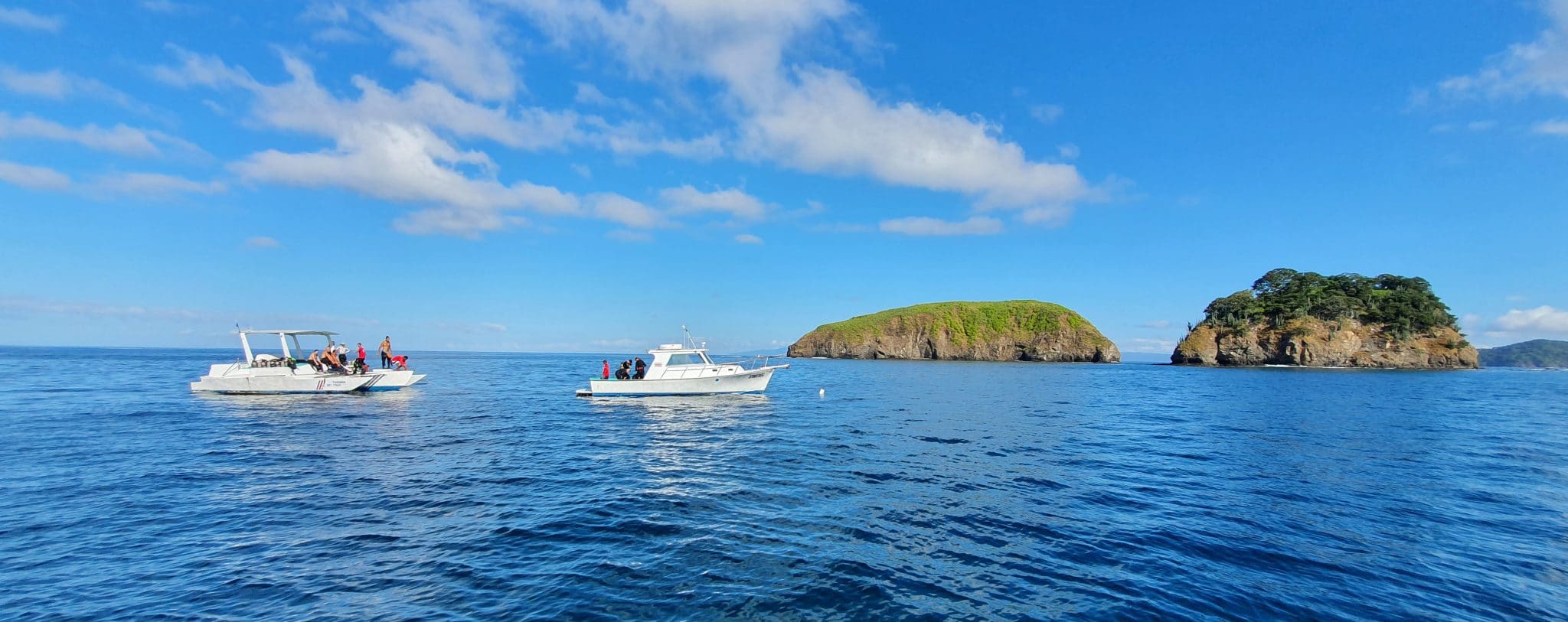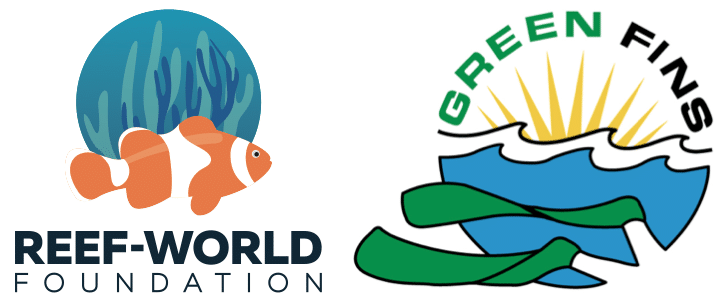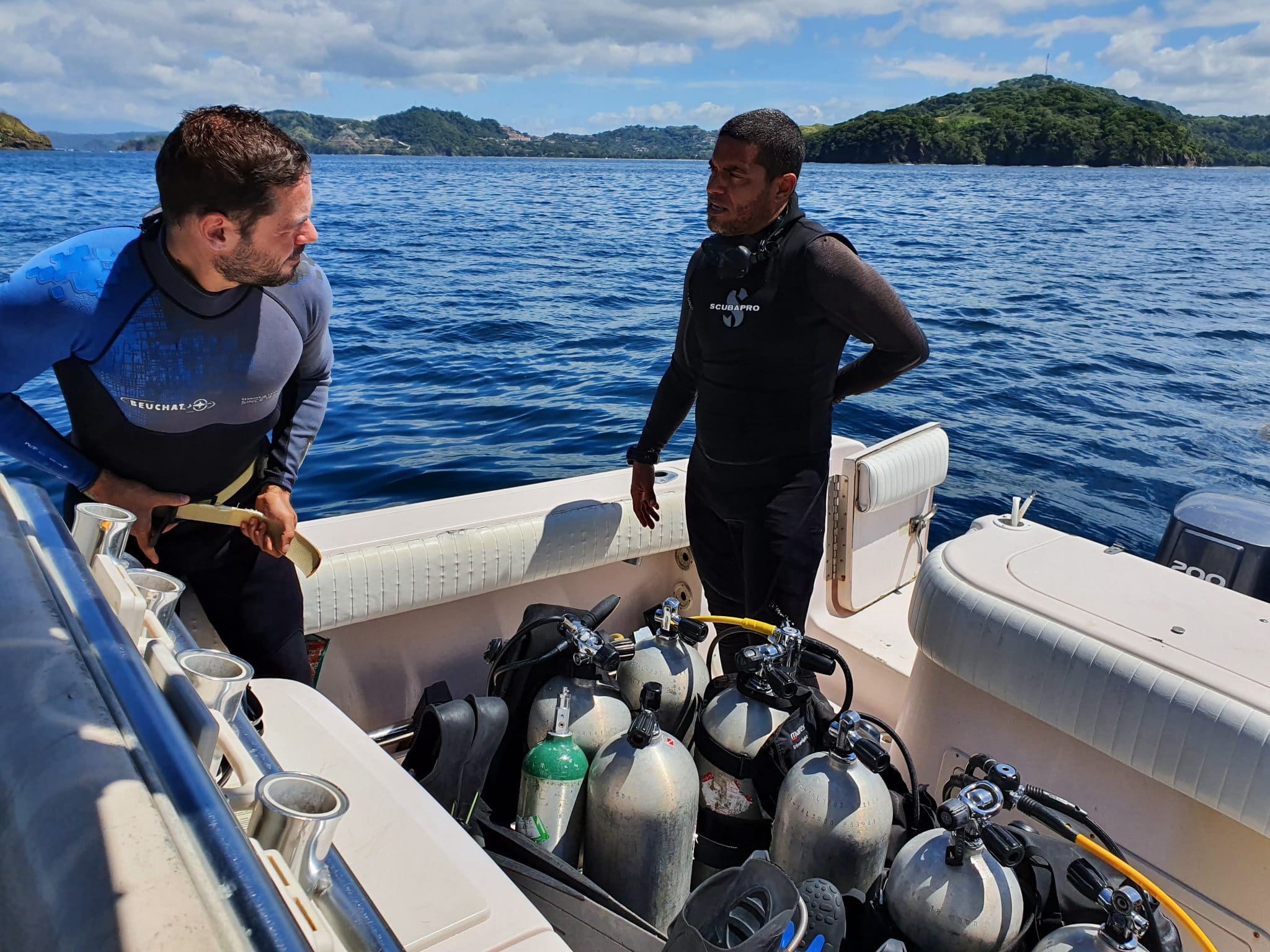Marine Life & Conservation
Reef-World Foundation releases 2021 highlights in latest Annual Report

 The Reef-World Foundation – international coordinator of the UN Environment Programme’s Green Fins initiative – has revealed the highlights and major developments in their latest 2020–2021 annual report. The report shows how the charity has had to adapt to the pandemic to continue to deliver and is determined to build back better.
The Reef-World Foundation – international coordinator of the UN Environment Programme’s Green Fins initiative – has revealed the highlights and major developments in their latest 2020–2021 annual report. The report shows how the charity has had to adapt to the pandemic to continue to deliver and is determined to build back better.
While grassroots work was unable to occur throughout most of the year due to the global pandemic, digital innovations have enabled the charity to continue to help the marine tourism industry reduce its direct and local impacts on coral reefs. Through the Green Fins Dive Guide e-Course, the charity continues to educate dive professionals worldwide to protect and preserve coral reefs, no matter their location. The course is now hosted independently on the newly launched Green Fins website. The revamped Green Fins website has a strong focus on increasing tourist demand for members and consolidating the charity’s digital portfolio. It is now easier for tourists to find active Green Fins members to dive with through a live member map and new content structure.
In addition, the charity developed two new guidelines for environmental best practices and four new language translations (Arabic, Japanese, Portuguese and Spanish) to expand the reach of its conservation message. The new website loads faster, is more mobile-friendly and is built to scale for visitor traffic peaks. The outcome from the update is the increment in Green Fins tools and resources downloads, a growth of 45.4% from the previous year.
Key highlights include the resignation of the founder of Reef-World, Anne Paranjoti. After 24 years dedicated to helping communities to tackle the many environmental threats facing their livelihoods, she has decided to step down as Chair and Trustee. The Reef-World team will sorely miss her guidance and support. Other highlights and new developments include: expanding the Green Fins online courses to meet the demand for education on sustainable diving from recreational divers with the development of the Green Fins Diver e-Course; selected for the Beyond Tourism Innovation Challenge along with Reef Check Dominican Republic and Misión Tiburón in Costa Rica to foster innovative solutions to transform and revitalise the tourism sector.
Furthermore, there will be a significant shift for Green Fins as the charity is updating the membership structure for Green Fins members, moving towards a minimum acceptable environmental standard for dive and snorkel operators. The charity is also developing a ‘Green Fins Digital Membership’ to meet the growing demand for the Green Fins initiative and to support the national teams. All that will be accompanied by a new Green Fins logo that incorporates the Green Fins’ ethos, the vast network of country teams and members, and the initiative’s maturity.
“Community conservation is at the heart of Reef-World and Green Fins. Activities and initiatives that link communities around the world and provide open access to resources are a key part of a good future. We all have interesting days ahead. After a pandemic that has impacted all over the world, we know we have to face up to changes together and with the right view in our hearts, no matter what we start with today, we can do anything,” said Anne Paranjoti, Founder of The Reef-World Foundation.
“As we move towards 2022 at a rate of knots, we are a stronger, more dynamic and fluid team ready to take on new challenges. The biggest changes to Green Fins since its inception are about to take place and I have every confidence in our team’s ability to ensure that these changes benefit our stakeholders and prioritise coral reef health moving forwards,” said JJ Harvey, Director at The Reef-World Foundation.
“These are difficult and uncertain times but also exciting and a real chance to maximise our potential and the impact that we can have on a global scale with a stronger and bigger team,” he added.
With 32 national and local government agencies or NGO implementing partners engaged, Green Fins now has 82 active assessors, 32% of whom are female. The Green Fins national teams are looking forward to resuming training and assessments as soon as it is possible and safe to do so. In addition, plans for Green Fins’ expansion into Japan and Colombia are in place when travel opens up again.
Chloe Harvey, Director at The Reef-World Foundation, added: “This year, we were met with challenges we couldn’t have possibly predicted. The best thing about completely being forced to erase an entire year of planned activity is that you can take stock, cut out the background noise, and work out what your stakeholders truly need from you during these difficult times. It was so uplifting to see our core Reef-World team rally together and ride on the support of our partners and network as we redirected our efforts to ensure conservation impact despite the lack of grassroots work. We go into our next operational year stronger than ever, our digital profile specifically so, and we are really excited to start the next chapter of the Reef-World adventure.”
Reef-World would also like to thank its partners whose vital support has resulted in significant tangible benefits for the ocean: PADI; The Matthew Good Foundation; 1% for the Planet; Explorer Ventures; Professional SCUBA Schools International (PSS); ZuBlu; GSTC; Dive O’Clock; WildSocks and Charitable Travel.
Find the full 2020–2021 Annual Report here: https://reef-world.org/reefworld-annual-reports
Marine Life & Conservation
Paul Watson Released as Denmark Blocks Japan’s Extradition Bid

Renowned anti-whaling activist Paul Watson has been released from custody in Greenland after spending five months in detention. Denmark’s Justice Ministry rejected Japan’s request for his extradition, citing insufficient guarantees that his time already served in custody would be credited against any potential sentence.
The 74-year-old Canadian-American was arrested on July 21 in Nuuk, Greenland’s capital, when his ship docked to refuel. His arrest was based on a 2012 Japanese warrant related to a 2010 encounter in Antarctic waters. Japan alleged Watson obstructed operations and caused damage to a whaling research ship during efforts to disrupt illegal whaling. Watson has consistently denied these claims, maintaining his commitment to marine conservation.
Denmark, which oversees extradition matters for Greenland, concluded that while the legal conditions for extradition were met, the lack of assurances from Japan regarding time-served credit made extradition untenable.
In a video shared by his foundation, Watson expressed gratitude and relief, saying, “After five months, it’s good to be out… and good to know they’re not sending me to Japan.” He added that the most difficult part of his time in custody was being separated from his two young sons.
Watson is a pioneering figure in marine conservation, known for founding the Captain Paul Watson Foundation in 2022 after decades of activism with the Sea Shepherd Conservation Society. His bold efforts to defend marine life have earned him widespread support, including from celebrities and conservationists. His work has also been featured in the acclaimed reality TV series Whale Wars.
Watson’s lawyer, Jonas Christoffersen, praised the decision, stating, “We are happy and relieved that Paul Watson is now free.” He added that Watson is eager to reunite with his family and continue his vital work.
The arrest occurred while Watson’s vessel, the M/Y John Paul DeJoria, was en route to the North Pacific with a team of 26 volunteers to intercept a Japanese whaling ship. His foundation described the arrest as politically motivated and emphasized that Watson’s actions were focused on ending illegal whaling practices.
Japan resumed commercial whaling in 2019 after leaving the International Whaling Commission, asserting that whale meat is a cultural tradition. Conservationists, however, continue to challenge these practices, highlighting their impact on marine ecosystems.
Despite the challenges, Watson remains steadfast in his mission to protect marine life and bring attention to whaling practices. His dedication to ocean conservation has made him a globally respected advocate for the environment.
Marine Life & Conservation
12 Days of Zero-Waste Fish-mas

This holiday period, the Marine Conservation Society, the UK’s leading ocean membership charity, invites you to make some simple changes to eating fish this Christmas to help our seas.
Dr Kenneth Bodles, Head of Fisheries and Aquaculture at the Marine Conservation Society, said, “During the festive season, our consumption increases, but so does waste. Sustainability isn’t just about where food comes from – it’s also about how you use it. By reducing waste and making the most out of your seafood, you’re not only taking steps to be more ocean-friendly, but can also help to cut costs during what is often one of the most expensive times of the year”.
The Marine Conservation Society has compiled twelve tips on how to consume seafood sustainably with zero-waste this Christmas:
Buy whole fish instead of fillets
Instead of fillets, consider buying whole fish such as salmon, hake, or lemon sole. By adopting a “nose to tail” approach with cooking, whole-baked fish not only feeds a crowd, but also helps to minimise waste and maximise sustainability by using up every part of the animal, including bones, skin, and fat.
Make fish stock
Leftover fish bones or shells can be put to good use by boiling them to make a nourishing fish stock or bisque. This can be frozen and preserved for later use and makes for a flavourful base in a soup.
Make your own fish pâté
Avoid waste by turning leftover fish, such as smoked mackerel or salmon, into a delicious pâté by blending with cream cheese and lemon. Perfect when paired with crackers.
The sustainability of salmon and mackerel varies depending on where and how it is caught or farmed. For more information on green-rated options, check the charity’s Good Fish Guide.
Buy frozen
By purchasing seafood that is frozen or vacuum-packed, this helps to reduce waste by extending the shelf life of your food.
Fish pie
If you’re wondering what to do with leftover cooked fish, why not opt for a classic fish pie with mashed potatoes, leeks, and a cheesy sauce? A sure crowd pleaser on Boxing Day.
Use the head
Don’t forget the fish head! The meat is incredibly tender and flavourful. The charity recommends a cod’s head curry or recreating Fallow’s renowned cod’s head in siracha butter.
By stretching your ingredients further, not only is this a more sustainable way to enjoy seafood, but also cost-effective by repurposing leftovers and cooking creatively.
Boxing Day brunch
Mix leftover kippers or smoked salmon with scrambled eggs for a tasty, zero-waste, Boxing Day brunch.
For best choice, make sure you buy kippers, or herring, from the North Sea and the North Irish Sea.
Zero-waste storage
A top tip from the Marine Conservation Society to avoid waste is freezing fish offcuts to save for future use.
Crisp up the skin
Even leftover fish skin can be turned into a quick savoury snack by crisping it up in an air fryer with a little olive oil and salt.
Anchovies two ways
Leftover anchovies can either be blended with butter to make a delicious anchovy butter or tossed into pasta for a hit of umami flavour.
The charity recommends opting for anchovies caught in the Bay of Biscay for best choice.
Fishcakes
For an easy, zero-waste meal, leftover seafood trimmings can be mixed with mash and fried in breadcrumbs to make fishcakes.
Pickled mussels
Try pickling mussels in 1:1 vinegar and water, with a dash of sugar for a sustainable, zero-waste snack that can be enjoyed well beyond the festive season.
Mussels farmed in the UK are a seafood superhero. Grown using low-impact methods and harvested by hand, they get all the food they need from the sea around them. This makes them one of the most sustainable, ocean-friendly, and cost-effective seafood options.
Players of People’s Postcode Lottery have raised £6.6M towards the Marine Conservation Society’s vital work in making seafood more sustainable.
Laura Chow, Head of Charities at People’s Postcode Lottery, said: “Fish is a festive favourite for many, but making sustainable choices when it comes to how we buy and eat seafood makes all the difference for our ocean. Support from players of People’s Postcode Lottery has helped the Marine Conservation Society further its sustainable seafood work, so that we can all enjoy healthier, better protected seas.”
The Marine Conservation Society encourages you to make sustainable seafood choices a year-round habit, not just for Christmas. To check how sustainable the seafood on your plate is, you can visit the charity’s Good Fish Guide. The Guide helps consumers and businesses identify the most sustainable seafood using a simple traffic light system, based on where and how species are caught or farmed. Green is the best choice, amber means improvements are needed, and red indicates fish to avoid buying.
Zero-waste gift idea
Why not embrace a zero-waste Christmas by gifting a membership to support marine conservation? It’s a meaningful, low-waste gift that helps protect our ocean for generations to come. Memberships start from as little as £5 a month – the price of a sandwich and drink from your local coffee shop.
Find the latest sustainable seafood advice for wild-caught and farmed seafood on the Good Fish Guide, downloadable to your phone from www.mcsuk.org/goodfishguide.
-

 News3 months ago
News3 months agoIconic SS United States to become the World’s Largest Artificial Reef
-

 Blogs2 months ago
Blogs2 months agoScubaverse Christmas Gift Guide 2024: Day 4
-

 News2 months ago
News2 months agoSanta Divers take the Plunge for Charity
-

 Blogs2 months ago
Blogs2 months agoScubaverse Christmas Gift Guide 2024: Day 1
-

 News3 months ago
News3 months agoDiscover Turquoise Divers and Media Luna Beach & Dive Resort: A Premier Diving and Relaxation Destination in Roatan
-

 Blogs2 months ago
Blogs2 months agoScubaverse Christmas Gift Guide 2024: Day 5
-

 Blogs2 months ago
Blogs2 months agoScubaverse Christmas Gift Guide 2024: Day 2
-

 News3 months ago
News3 months agoToucan Diving at Plaza Beach and Dive Resort Bonaire Introduces PADI Mermaid Training
















